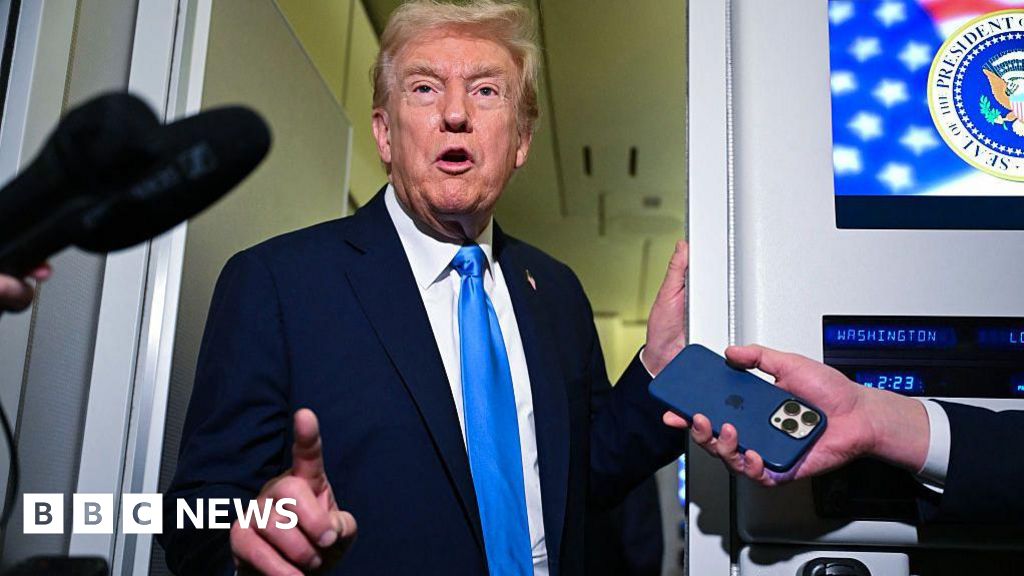There are many ways to characterize Proposition 50, the single ballot initiative that Californians will be voting on this election season.
You could say it’s about redrawing congressional district lines outside the regular once-a-decade schedule. You could say, more precisely, that it’s about counterbalancing Republican efforts to engineer congressional seats in their favor in Texas and elsewhere with a gerrymander that favors the Democrats. You could, like the measure’s detractors, call it a partisan power grab that risks undermining 15 years of careful work to make California’s congressional elections as fair and competitive as possible.
The way California’s governor, Gavin Newsom, and the Democrats are selling it to voters, though, boils down to something much simpler and more visceral: it’s an invitation to raise a middle finger to Donald Trump, a president fewer than 40% of Californians voted for and many loathe – for reasons that extend far beyond his attempts at election manipulation. For that reason alone, the yes campaign believes it is cruising to an easy victory.
“There’s actually a double tease here,” said Garry South, one of California’s most experienced and most outspoken Democratic political consultants who has been cheer-leading the measure. “Trump and Texas, the state Californians love to hate. How can you lose an initiative that’s going to stick it to both?”
Proposition 50, also known as the Election Rigging Response Act, proposes amending the California constitution and suspending the work of the state’s independent redistricting commission until 2031 so the Democrats can carve out five additional safe seats. That wouldn’t significantly change the power balance in California, since Democrats already occupy 43 of the state’s 52 House seats.
But it would compensate for the five seats that Texas Republicans, acting on Trump’s direct urging, wrested for themselves earlier this year. “Fight fire with fire,” has been Newsom’s mantra, and several influential national figures in the Democratic party – everyone from Alexandria Ocasio-Cortez, the prominent New York congresswoman, to former president Barack Obama – have signed on.
Democrats are optimistic they will see a significant vote shift in their favor next year, because Trump’s approval ratings are already underwater in the swing states that he narrowly won last November, and in California he is polling as low as 29%.
But that won’t translate into more congressional seats if district boundaries are redrawn in a way that protects vulnerable Republican incumbents and eliminates meaningful competition. According to one estimate by the Brennan Center for Justice, Republicans already have a net 16-seat advantage for themselves in House races, thanks to gerrymandering efforts across the country in the wake of the 2020 census. The Texas move increases that advantage to 21 seats. And similar, smaller-scale moves in Missouri and North Carolina bring it to 23.
“Republicans want to steal enough seats in Congress to rig the next election and wield unchecked power for two more years,” Obama charges in a widely aired campaign ad that began circulating last week. “With Prop 50, you can stop Republicans in their tracks.”
Polls and focus groups suggest many Californians have mixed feelings about abandoning their state’s non-partisan district maps, but a slim majority say they see the need to do so anyway and plan to vote yes on 4 November.
Support for the measure has been rising steadily. Earlier this month, the yes vote was barely cracking 50% in most of the polling, and about 15% of poll respondents said they were undecided. Another 30% indicated that their support for or against was soft.
Two surveys published this week, however, showed Proposition 50 passing by at least a 20-point margin and the yes vote is now up in the high 50s or low 60s. Fully three-quarters of those intending to vote yes told a CBS News poll conducted by YouGov that they were doing so to oppose Trump, just as the yes campaign has been urging.
Ballot initiatives are not quite like other elections, though, especially in an off-year election likely to result in lower turnout than usual.
“The history of [these] campaigns in this state shows that late-deciding voters tend to vote against initiatives,” said Dan Schnur, a former Republican campaign consultant who teaches political communications at Berkeley and the University of Southern California. “They’re expressing an inherent skepticism that arises if voters don’t know a lot about a measure. They want to guard against it making their lives worse.”
after newsletter promotion
The latest polling data suggests that such last-minute skepticism may not apply in this case, most likely because Trump is such a polarizing, and motivating factor. Polls consistently show higher support for Proposition 50 among so-called “high propensity” voters – those who show up at the polls time after time – and early mail-in voting returns indicate stronger than usual numbers, with registered Democrats outnumbering registered Republicans by almost a two-to-one margin.
The “yes” side has outraised the “no” side and been far more visible in campaign ads and appearances. Kevin McCarthy, the former House speaker who represented a southern California district for 16 years, promised over the summer to raise $100m to defeat Proposition 50 but has managed only a tiny fraction of that – less than $6m, according to the secretary of state’s office. And the big Republican guns who might ordinarily have hit the campaign trail have been conspicuous by their absence – something that suggests to many political observers they think the fight is unwinnable.
Overall, the yes campaign has outraised the no campaign by about $138m to $82m.
Even the pleas of the no campaign’s most visible advocate, Arnold Schwarzenegger, have proven ineffective. According to an Emerson poll, two-thirds of voters say it makes no difference to them what Schwarzenegger thinks. As a Republican, he lacks credibility with many Democrats, and as a moderate who loathes Trump, he has little traction with the Republican base. More than 20% of voters say his advocacy actually makes them more likely to do the opposite of what he wants.
The problem for the no campaign, according to South and others, is that there is no message persuasive enough to counter the visceral appeal of “screw Trump”, particularly at a time when California voters are angry about ICE raids, military deployments in US cities including Los Angeles, federal funding cuts, the destruction of the East Wing of the White House, and more.
Some groups, including one led by the billionaire Charles Munger Jr that has ploughed more than $30m into the no campaign, have pushed the argument that Proposition 50 is undemocratic. But national polling has consistently shown that appeals to democracy do little to sway voters because both sides think it is at stake. Calling Proposition 50 a “power grab” merely reminds voters that Republicans in Texas grabbed power first.
Other opponents, including Steve Hilton, the leading Republican candidate in next year’s governor’s race, have sought to stir voter discontent with Newsom and cast the initiative as one more distraction cooked up by a governor with national ambitions when he should be focusing on the state’s housing shortage and affordability crisis. Hilton calls Proposition 50 an “illegal and corrupt contribution to [Newsom’s as yet unannounced] presidential campaign”.
That works as red meat for the Republican base. But the last time Republicans tried to turn the California electorate against Newsom in a stand-alone ballot initiative – a recall vote in 2021 – Newsom prevailed by a 62-38 margin. And Newsom’s approval numbers have only increased as a result of Proposition 50.
“The no side has two problems with its core argument,” South said. “It’s too complicated, and it’s too abstract. The average voter doesn’t have a clue what their congressional lines are. And, in addition to that, they don’t care.
“So the choice comes down to: you can screw Trump, or you can pay homage to a redistricting commission that voters approved in 2010 and probably don’t remember. There’s no way this thing loses.”

